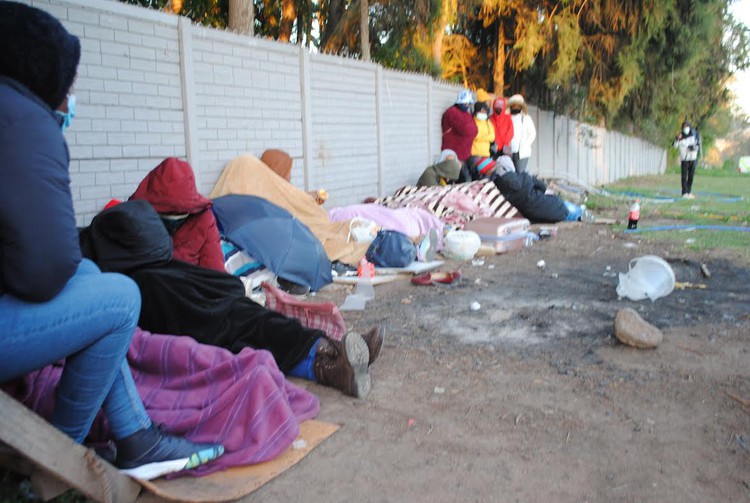
21 October 2021
Women waiting for an abortion queue all night outside Mthatha Gateway Clinic. Photo: Mkhuseli Sizani
Pregnant women are sleeping outside the Mthatha Gateway Clinic in the hope of getting an appointment for an abortion.
On Monday morning at about 5:30am we caught up with some of the women who had slept outside the clinic on pieces of planks and cardboard, in icy weather. Some of the women woke up and relieved themselves next to the wall in full view of everyone. Others tried to warm themselves in the sun.
On Mondays and Wednesdays scores of women sleep outside this clinic in order to make the list of 21 people served per day. Late-comers are turned back and there seems to be no booking system in place.
Nikiwe Njemla from Sibangweni, who has two children, was second in the queue after being turned back home last week.
“I started to queue here on Sunday at 8am for a clinic that will open today at 8am. The first patient in the line arrived at 7am. I was advised by other patients when I was turned back last Wednesday with more than 60 other women. I was number 24 in the line on that day.
“Today I had to brave this cold and rainy weather and sleep outside the clinic with other patients.”
Njemla said sleeping outside the hospital was embarrassing. “We feel humiliated and are stigmatised as if we are doing something illegally although abortion is legal in this country. Everybody knows that we are here for abortion because the nurses say we must queue next to this container.
“But all other patients are queuing in front of the main gate a few hours before the clinic opens.”
“We are wet and feeling cold because last night’s rain fell on us. Normally patients used to burn a tyre at night and warm themselves. But we couldn’t get a tyre. We used our blankets and jackets to warm ourselves. We also use our jackets to shield one another when we poo and pee because there is no privacy. The hospital must give us a waiting room.”
Thembi Sgidi from Mqanduli said she had been turned back a week ago with 40 other patients because the clinic list was already full. “I have already spent R166 for the two days coming to this clinic. I am unemployed and the baby’s father dumped me after I told him that I was pregnant. I have two children and I survive by their grants. Keeping this child without support was going to be difficult.”
“I arrived here at 6:30pm on Sunday and I was number 19. We have to make the list ourselves of the 21 patients on a piece of paper. Then a nurse comes at 8am and calls us according to that list.”
A 21-year-old who is rewriting grade 12 and who did not want her name used said she had taken a big risk coming to the clinic. “My parents don’t know that I am here because I want this to be a secret. This is the third time coming here after being turned back twice last week. Today I had to hire a private car for R120.”
A 45-year-old woman who also asked to remain anonymous said, “After calling the list of 21 patients the nurse tells us if we are in a hurry we should go to a private clinic that charges R1,400. She seems not to care about us. Some of us are three months pregnant. After four months the abortion is not allowed.” (Abortions are allowed in South Africa after 13 weeks, but under certain conditions.)
“Poor treatment like this forces some of the women to go for illegal abortions.”
Head of the Eastern Cape Health Department Rolene Wagner said: “At the heart of the matter is the need to strengthen awareness and use of family planning services to mitigate the high numbers of unwanted pregnancies in the area.
“Our facilities operate as per the designated hours of services… We do not condone that clients resort to literally camping outside our facilities to access our services as we are not able to assure them of humane conditions such as shelter and security outside our working hours and premises.”
“It is distressing to us when our clients resort to such measures to be able to access services.”
Wagner said the abortion service was only offered in clinics with specially trained personnel, and high turnover of staff meant that some of the facilities were “not rendering the service as before”. She said the department was exploring partnerships with other organisations “to supplement our existing internal capability” to help prevent unwanted pregnancies and provide Choice of Termination of Pregnancy services “that meet the demand of our communities”.